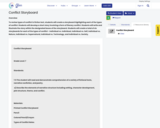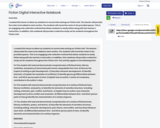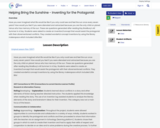
Students examine the characterization of a character in a novel or short story to complete the "Autopsy of a Protagonist" slideshow.
- Subject:
- English
- Fiction
- Material Type:
- Assessment
- Author:
- Deb Wilkinson
- Date Added:
- 03/28/2021

Students examine the characterization of a character in a novel or short story to complete the "Autopsy of a Protagonist" slideshow.

To conclude any novel read in class or as a book report option, students will create a Bloom Ball book report. The twelve-sided structure will require students to answer questions connecting to the novel. Each face of the structure will ask a question that aligns with a particular level of Bloom’s Taxonomy.

To review types of conflict in fiction text, students will create a storyboard highlighting each of the types of conflict. Students will develop a short story involving a form of literary conflict. Students will write and illustrate the story within the designated boxes of the storyboard. Students will create a total of six storyboards for each of the types of conflict - Individual vs. Individual, Individual vs. Self, Individual vs. Nature, Individual vs. Supernatural, Individual vs. Technology, and Individual vs. Society.

This video is part of the Continue to Know with WHRO TV series. Watch Kelly Sowden teach about conflict and resolution.

The teacher will review the six types of conflict found in literature (individual vs. individual, individual vs. technology, individual vs. nature, individual vs. self, individual vs. supernatural, and individual vs. society). Students will create conflict in the news presentations identifying the six types of conflict. Students will use current newspapers and credible online news sources to identify and correctly label current examples of conflict today.

In this lesson, students will be introduced to the idea of decomposition. Specifically the lesson caters to math word problems, but could be easily modified to any subject (as found in the modificaitons section of the lesson plan). Students will engage with each other and the vocab to work through an easy process to decompose word problems into manaeagable pieces as a strategy to solve. All activities are low prep and can be modified to your needs. This can be a stand alone lesson or expanded by using Part 2 and Part 3 to deepen understanding through coding activities.

This is the final part of an extended lesson on decomposition. Students will create a word problem to decompose and then use GameChangineer to create a mini game that is reflective of the word problem and its solution. Students will be using the plan, design, and review process thourhgout their creations. A rubric and self reflection tool for the final products are included. Activities are low prep with modifications included, but do require organized planning to implement effectively. If you have not done a lesson on decomposition, it is suggested you use Part 1 to help student's gain the necessary understandings of the processes used in this lesson. If you have not done a lesson on writing commands and using GameChangineer, it is suggested you use Part 2 before implementing this independent activity.

English Instructional Plan Direct and Indirect Characterization 6-8

This is a Jeopardy Review game to work with students on English terms.

Remix of https://edsitement.neh.gov/lesson-plans/citizen-vi-train-woman-standing-claudia-rankine Adding a variety of texts to compare and connect to the original poem activity

I created this lesson to allow my students to record notes during our Fiction Unit. The teacher will provide the notes to be added to each section. The students will record the notes in the provided spaces. This is an engaging note collection method that allows students to easily follow along with the teacher's instruction. In addition, this notebook will provide a collective study set for students throughout the Fiction Unit.

Have you ever imagined what life would be like if you only could see and feel the sun once every seven years? How would you feel if you were alienated and ostracized because you are the only child on planet Venus who has memory of the sun. These are questions generated after reading Ray Bradbury’s All Summer in A Day. Students were asked to create an invention/concept that would assist the protagonist with their aforementioned conflicts. They created wonderful concept inventions by using the library makerspace which included Little Bits!

English Instructional Plan – Elements of Plot 6-8

English Instructional Plan Plot and Characterization -7

This video is part of the Continue to Know with WHRO TV series. Watch Andrew Sytsma teach about using details from the story to understand character development.

English Instructional Plan Setting and Plot 7

English Instructional Plan – Theme Analysis 6-8